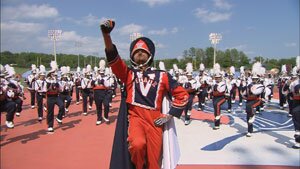FILM- Election '08: And the marching band played on

PUBLICITY PHOTO
Clashing cymbals, twirling batons, synchronized marching... and political rhetoric? Only in French director Claude Miller's latest documentary, Marching Band, which follows the lives of UVA's marching band while last year's now-legendary campaign of Barack Obama fired up young voters across the nation. But is the marching band– traditionally the butt of jokes for cinema and pop culture– an accurate receptor for youth in America?
"People at UVA are very much well-rounded people– especially in this band," says sophomore piccolo player Abby Heider. "We're all involved in so many different activities, and there are a variety of interests and goals. We're not all music majors!"
Diversity is a key factor, for both the band and the film. Miller and his production team contacted band director William Pease in February, 2008, as the presidential race began sweeping across the country, and Virginia was identified as a crucial swing state.
Hoping to find a group of students to parallel the wave of enthusiasm seen in the youngest voting demographic, Miller identified UVA and fellow state school Virginia State University's marching bands as passionate, educated, and vocal student groups.
"They came to talk to us about our vision of the marching band and what we do on a daily basis, but they were never clear about the angle," says Pease, now in his sixth year directing UVA's ensemble. "It ended up being more a political statement about the election than about the activity of a marching band."
Miller has previously been vocal in the French media about his fascination with the American institution of marching bands, stirring up vintage ideas of grandstand bands rallying behind a political candidate on a soapbox. While admittedly a more liberal-leaning band, UVA's marching band insists that it was its diversity– in political preference, extracurricular activities, backgrounds– that matched Miller's preconceptions of both American bands and youth.
"It's great that you can talk politics and still be a part of the same group– that's one thing we agree on with the students," says Pease. "You don't see divisiveness here on Grounds; it's a nice culture to be a part of."
Despite the political charge resonant throughout the film, the students and their passion for both music and change remain the cinematic highlight, according to Pease.
Infiltrating the band for nearly three months in the fall of 2008, Miller and his crew attended summer band camp, cheered at football games, and (supposedly) tagged along to parties. And although the band only comprises a small portion of the university population– just two percent– and has mixed political leanings (despite the film's emphasis on Democratic supporters), they managed to accentuate a key characteristic of university students, a mainstay of the Obama campaign, and a feature of an emerging generation: the willingness to accept change. Even if that change meant camera crews, lights, and microphones taking over their lives and practice time.
"It was very strange having a camera there from the very first day the students arrived for band camp," Pease recalls. "But it ended up blending in with everything else that was there– the traffic, Cav Man running a horse through the band, the railroad tracks– I don't think it made much of a difference in anything we did."
7pm, Thursday, November 5 at Culbreth Theatre. Q&A with director Claude Miller, Annie Miller, Professor Peter Kirkpatrick, and members of the UVA and VSU marching bands to follow.
#